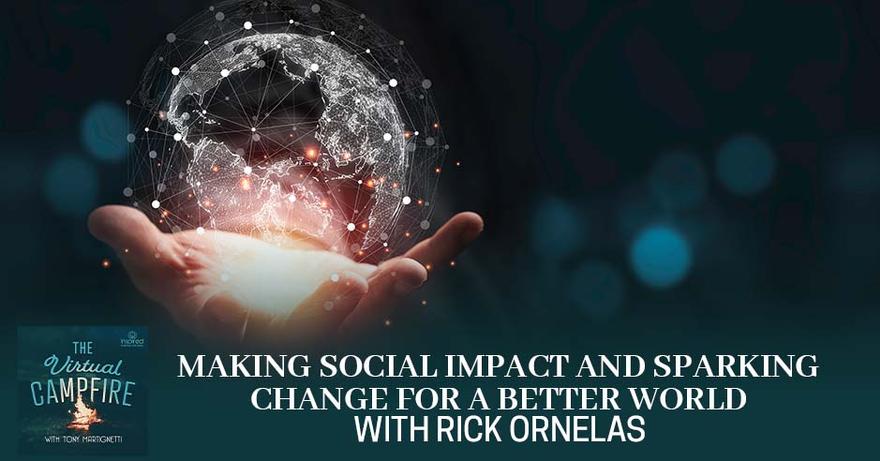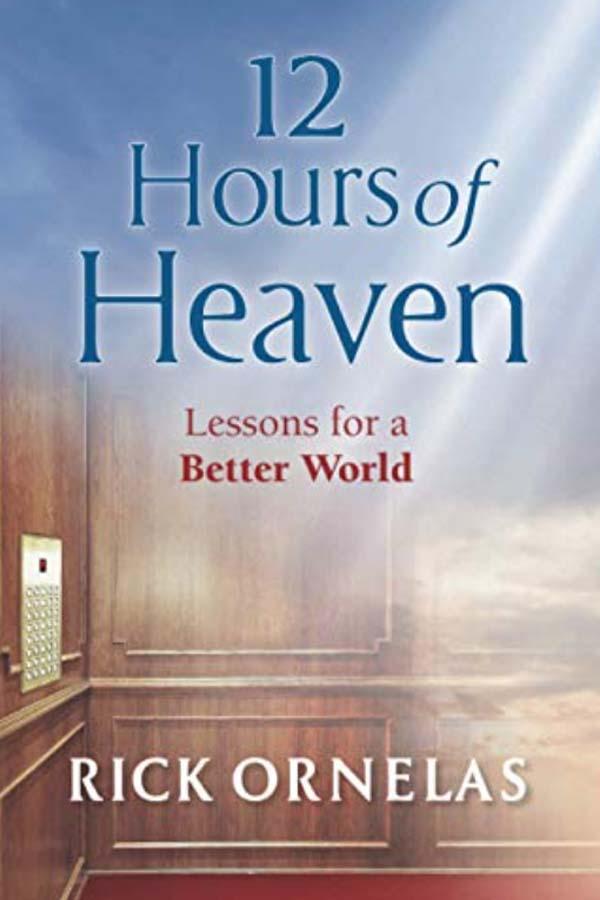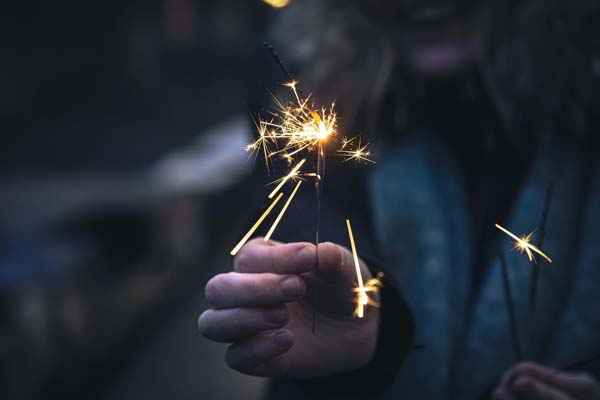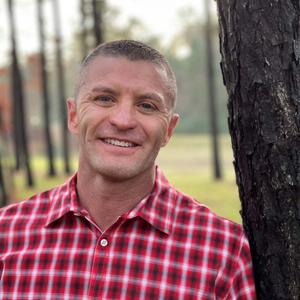Making Social Impact And Sparking Change For A Better World With Rick Ornelas

Are you confident you can spark change and make a difference in people's lives? Join host Tony Martignetti as he interviews Rick Ornelas about making positive changes and social impact for a better world. Rick is the founder of I Spark Change, a community of those elevating their social impact and spreading positive change in everything they do because humanity matters. In this episode, he shares his journey driven by faith, discipline, and important milestones. He discusses the importance of releasing your emotions and becoming your whole self. Things could be difficult sometimes, but you have to rise above those challenges and become the person you’re meant to be. Believe that you are meant to achieve great things, spark change, and make a social impact for a better world.
---
Listen to the podcast here
Making Social Impact And Sparking Change For A Better World With Rick Ornelas
It is my honor to introduce you to my guest in this episode, Rick Ornelas. He is the ultimate success coach, bestselling author and Founder of I Spark Change. He helps entrepreneurs flourish personally and professionally by eliminating the roadblocks preventing their success. He empowers others in this community to spread positive change and elevate social impact. He has been featured as an expert in multiple media outlets, including television and radio. He's a regular writer for Lifehack and has inspired listeners across the globe as a guest on over 80 podcasts. He lives in Houston with his wife and three daughters. It is my pleasure to welcome you to the show, Rick.
Thank you very much for that cool intro, Tony. It's an honor to be here.
It's got to be fun. This is going to be the best episode. You've been on a lot of shows but we're going to have a lot of fun exploring your story.
Let's bring it on.
What we do on the show is explore what's called flashpoints. These are points in your journey that have ignited your gifts into the world. As we're covering that, what we'll do is we'll pause along the way and see what shows up. One of the things that's important is we want to uncover what made you into the person who's making such a big impact in the world. That's what we're looking to understand from your journey. With that, Rick, I'm going to pass it on to you and let you take it away.
There could be a lot of flashpoints along my journey. I like the term flashpoints because one thing that I talk about in our community, I Spark Change, is spark moments. It's an individual moment that can have a ripple effect. What flashpoint exemplifies as well is that it can be that quick like a flash that can change the trajectory of your life. I was going to go out of order but I'll go in order time-wise.
I'd say the first flashpoint for me would be being born into a big family. I have four older sisters, no brothers and parents that were very loving and caring. They had plenty of issues but they still did love and taught us the importance of family, faith and discipline. Looking back, the most important flashpoint for me would be growing up with that family with that strong faith and discipline molding me into who I am.
Faith is embedded in who you are and will always be there in some shape or form.
You're starting from that place of a good foundation and knowing the values and things that are instilled in you at that early age. It's important to know that those things start to show up later in life as you get into your adult life, at least, I would expect. That's a lot of what you do.
It’s not always evident because as with anyone, you go through waxes and wanes and up and downs along the way. To use faith as an example, a big part of who I am is my faith. I remember when I was younger, a teenager and even when my wife and I first got married, that wasn't super important for us. It drifted away from that and we focused on other things. You're young, into having fun, having a great time and all that.
Those seeds that are planted when you're young will nurture. They're like bamboo. It may stay for years under the soil before it sprouts. Something that was embedded in who you are will always be there in some way, shape or form, good or bad. Faith has flourished as I've gone throughout my life and even other things that I've had to work on over the years.
My family like most families had its issues. My parents divorced when I was thirteen and my father struggled with alcoholism for many years. Those types of things have an impact on you that leaves an impression whether you realize it or not. In a good way, they've caused me to work on who I am to make sure that I don't “make” some of the same mistakes that my parents did or have some of the same challenges that they did when I was younger.
It's like they're a part of you but they don't define you. They become part of your story but they don't have to be something that you have to live that part of you all the time. That’s what's interesting about looking back on the past and seeing how they have integrated into your life.
It's that way for all of us because all of us are going to be a combination of the influences, the stories and the relationships that we've had throughout our lives. They can define us. For example, growing up as I did with an alcoholic father for decades, they could have more of a victim mentality or like, “I'm going to turn into that too. I can't change my life.” You become defined by it.
It's important to realize that we always all have choices. Whether we think we don't or not, we always have choices and we can always choose to improve our situation, whether we think we have that ability or not. I firmly believe that we do. We don't have to be defined by external circumstances or things from our past.
 That's what having faith is about to me, at least. I like to think of faith as having this ability to see that we always have a choice and how we want to believe.
That's what having faith is about to me, at least. I like to think of faith as having this ability to see that we always have a choice and how we want to believe.
It's true because, with faith, you can be in a very difficult time. When I've had challenges in my life like deaths and traumatic experiences, those could be times where I could have easily drifted from my faith or could've said, “This is what my life's going to be. I'm going down some bad road.” Have faith that things will get better, you can change the circumstance or it happened for some reason that you can't see at the moment. Life will teach you that lesson. You just have to be patient a lot of the time. There are lots of those in my life that maybe it was some event that happened a long time ago that I didn't realize until much later the reason why.
I want to get back into your story and hear what happens next along your journey as you evolved into your teen years and beyond. What are the things that were some more flashpoints for you?
There are plenty of little milestones along the way but I'd say the next big flashpoint for purposes of what we're talking about would be when I met my wife, Tonya, when we got married and started a family. We were 24 when we got married and had our 1st daughter right away. Starting a family at that young age changed me. I was so focused on myself and selfish in many ways. For example, even after my daughter was born, I'd still be going to play basketball for three hours at night, not coming back for hours and stuff like that.
It wasn't until a traumatic experience a few years later that a lot of that changed because I started putting the emphasis on my family and taking the emphasis off of myself. I believe you have to do that in a relationship, first as a spouse and as a father or a parent that your kids come first. I learned that they came first. I may not have realized that when I first got married or had kids but that seed had been planted when I was a kid because that's how my parents were.
They were like, “Family comes first.” They put us first in everything. Even when they got divorced, they wanted to make sure that everything was okay for us, where we lived and all these things. The next flashpoint for me was to understand that my family was going to be the driving reason for everything I do and the most important aspect of my life and they still are.
It's a powerful thing to go through because oftentimes, it is a struggle to make that change from being self-centered. Not self-centered like, “It's all about me,” but we go from being a party of 1 to a party of 2, 3 and then eventually 5. We have to think, “Where is my center of gravity? How do I make sure that I think about that in different contexts?” There's one thing that is interesting and you can relate to this. Even though we're not self-centered, we still have to take care of ourselves. We have to be mindful of our interests in relation to all the people around us because if we don't take care of ourselves and think of our interests, then we can't be there for the people around us.
All of us are going to be a combination of the influences, stories, and relationships that we've had throughout our lives.
It's so true. There have been times in my life when I have not taken care of myself and put my focus on my family, not just my kids but also my mom, my sisters and everything. There have been times when I shifted my focus to be about others and not on myself. A good example and this will take us to a flashpoint for sure was in 2004. I was going along. I had my family. I was focused more on them. In 2004, one of my sisters committed suicide. She had struggled with bipolar depression for many years. She'd gotten out of the hospital too early and ended up taking her life.
I noticed in the time afterward that my mom was very distraught. It still affects her, also my dad and my other sisters. I had always been the rock for the family. I had been that source of comfort and strength for the family. I've been that and probably still am in many ways. It’s a little less after we’re located from California to Texas and don't live where the rest of my family lives but I still have that role in many ways but it was a lot more so back then.
When that happened, I found myself trying to be there so much for everyone else that I even started getting depressed myself. I had never struggled with that at all. I remember making a doctor's appointment and going in. He was concerned about me being depressed and this was maybe a month or so after my sister passed away.
He was talking about putting me on medication and saying it was going to take a while. I decided not to take anything at that time but that's where I realized, “I need to take care of myself.” I was like, “You're right on your point about that self-care. I was so focused on everyone else that I wasn't thinking about how it had affected me.” It ended up hitting me in different ways to where I had to pull away from the situation. It even affected my marriage in some ways, my relationship with my wife and everything. It was all because I wasn't doing that self-care and giving too much.
Thank you for sharing. I can't tell you how much this hits home. With the stories that I've heard from the other guests who've come on with similar situations, the ripple effects of having these situations in a family are profound. It’s hard because you do have to think of all of the parties involved like yourself, the people around you, your family members and how they've been impacted by these situations. One thing I will say is that if someone's reading who's going through some tough times, know that you're not alone. Hearing from what Rick had shared, these are challenging situations and it's not to be taken lightly.
Something that I say a lot as well, Tony, on my podcast or when I'm coaching others is you're not alone. I was that person. You feel that whatever you're going through, the weight of the world is on you and you have to go through it alone. I was that way for many years. I would isolate myself from my wife, family and friends.
It wasn't until I started to break down that I started sharing my emotions and realizing the power of sharing those emotions and how much better you could feel. Others can empathize, give you compassion and share that weight that you're not holding that weight of the world. They're taking some of those burdens from you. One thing that I help others with is to see that they're not alone. I try to be there for others to see that they're not alone too.

One thing that I'm picking up from this conversation is that this moment, as much as it's a very challenging situation, it also was a very deep experience for you to be able to learn the depth of emotion that you can express and be open to expressing that emotion. It makes me think of this quote that I love. It's from a guy by the name of Peter Bregman. He is a past guest of mine, as well as a person who I truly love.
The quote is, “If you're willing to feel everything, you can have anything.” It is not so much about having all the stuff but letting yourself into the different emotional range that allows you to experience life to its fullest. That's how I interpret that to be. That is allowing you to open up to other people. Don't be that stoic person who holds back all their feelings because you're missing out if you do.
My father was that way very much. My generation, Gen X and my father's generation, the Silent Generation, were taught to hold in your feelings. You're stoic and you don't show emotion. You're strong. To show emotion is weak. If you were crying, they’re like, “Don't cry.” You look at old movies where the boy cries, he's being made fun of and all that stuff. I remember an example of myself where that happened in first grade. It was something in the bathroom. I was crying and all that. I'm the one that's been made fun of. You have those experiences in life. They end up where you've tried to hide your emotion and keep it in. It's a conditioned response.
Over the years, I realized how much beauty there is in sharing those emotions, the depth of emotions and experiencing all of those. You end up limiting yourself. I know some of the Buddhist teachings like to take in every experience, good or bad and feel all of it. The only meaning it has is the meaning we assign to it. Let's say you stub your toe. You get all pissed off and start yelling and cussing because you stub your toe. You attach that meaning to it.
If I choose to say, “Maybe I should move that box that I've been having to put away in the garage for three months, then I wouldn't have stubbed my toe.” If I look at it as a learning opportunity and take responsibility, then I've attached a whole entirely new meaning to it. When you can get in touch with those feelings and feel that depth of emotions, it's a very freeing place to be. In the past few years that I've evolved as a human being, I feel so much more aligned with my values, in touch with others and more empathetic and understanding. I am a better listener. I have so many improvements because I'm probably operating as a whole person instead of a fraction.
I love that mentality of seeing that we can have more experiences by opening ourselves up to that and not holding ourselves in that victim mindset of, “This happened so I'm going to stay small and complain about it.” Instead, I'm going to say, “What am I learning from this? What can I do with it?” That's very cool. Are there any more flashpoints? How did you come to be doing the work that you're doing? It sounds like it's a normal progression from the path you've been on. What prompted you to get into doing the work you're doing?
There are a couple of flashpoints that'll come out in this answer. I have to rewind the clock and then fast forward it. You'll understand this. First I'll start with fast forwarding. We had been going about life. We were happy, raising a family and things are great. I had gone through a successful career, first, in the corporate world and then with some startups. I then had gone off on my own as a coach and consultant in 2015. I was going along very happy. I felt that I was living the life that I had wanted to.
We can always improve our situation, whether we think we have that ability or not. We don't have to be defined by external circumstances or things from our past.
We get to 2020 when the pandemic starts and life changes for everyone. All of a sudden, my coaching consulting business goes from what I deemed successful to almost nothing. Many of my clients decided to put their services on hold or stop altogether. For one main client, I was the acting COO and ended up having to resign from that position to help the business. All of a sudden, I find myself with no revenue coming in for my business. I find myself in quarantine like everybody else but very anxious and afraid of the future like, “How am I going to pay my mortgage and take care of my family?”
I hadn't had any types of mental health or concerns like that since that time after my sister. It wasn't a comfortable place for me to be. I hung around there for a few weeks and then realized that I knew better. I was like, “What are you doing?” You coached people on this and you know that you can change your mindset like this. I started to write and I wrote a blog about using the time as an opportunity to help others, be grateful and focus on what they could control.
I then started writing what would become my book, 12 Hours of Heaven: Lessons for a Better World. Here's where the rewinding of the clock comes in. That book had been in my head for about twenty years. I hadn't written it because I was going about life and content thinking, “I'm happy. Everything's great.” It wasn't until I was forced into a corner that I'm like, “You need to write this book that you've been wanting to write forever. You have the time.”
The book was inspired by a major car accident where I could have killed my family. I was living in Southern California and we were driving home from a children's birthday party. I had my wife and two daughters at the time. They were 1 and 4. We were driving back from this birthday party and it started to rain hard. The road was slick and cars were pulling off because it didn't seem safe but we continued because we were a couple of hours from home and it was getting late on a Sunday and dark.
I then lost control of the vehicle. It spun out of control four lanes to the left and we were about to hit the center divider. I had tried to steer and didn't have any control. Miraculously, were inches from hitting the center divider and we start spinning in the other direction. We spin across the four lanes the other way. We go off the shoulder and upper dirt embankment. We hit a brick wall, flip over and land back on the wheels. The windshield was shattered and the right side was all shattered and smashed in.
The roof was down to about eye level. We were all unscratched. Witnesses thought we were killed. The tow truck driver said that we shouldn't have survived. We were very fortunate that nothing happened to us. It was the combination of me writing the book that was inspired by that accident and remembering what had happened that when 2020 came around and I was thinking I didn't have any control and starting to go into that victim mindset that I realized that I could change my life and take control.
Not only was I supposed to write a book but I felt called to do more, help others and create a better life for way more people than just those that would read the book. Maybe that's a mega flashpoint or something. Tony, maybe that's a flash fire. I don't know what to call it but it was a big one because it changed everything. It took a little bit of that history and what was going on in the present to come together and change everything for me.

That is quite a lot to react to. Thank you for sharing that. It's a powerful story because it took you being in this moment of the 2020 pandemic to see, “Life is fragile and in a split second, things change for the good or for bad.” Luckily, the angel has been on your side on almost every occasion, thank God.
Praise God. I firmly believe that and it's interesting you say angels because the 12 Hours of Heaven is a fictional story inspired by that accident. The inspiration came because many people had said, “Your guardian angel protected you.” My mom gave me this little guardian angel pin to stick in my car. Staring up at that pin one day, daydreaming and reflecting on the accident because I went through a period of a few months where I would always sit there in the car and think about it, that's where the idea for 12 Hours of Heaven came from. It hit me as I had just watched it as a movie and it was sitting there staring at that angel pen.
The story is a fictional story about an angel that is sent down from heaven to help people on Earth through their challenges. There are life lessons in it but it's the way that I had been helped in different things along the way. I’ve been protected, guided or however you want to look at it in all the different circumstances of my life. Whoever my guardian angel is, he's put in overtime, for sure. He deserves a raise.
I want to take this to take us in a slightly different direction because you've shared so much and it's been a powerful episode for sure. I want to ask you, what are the things you learned about yourself in this journey that you feel that you want to share with the audience? Little lessons about yourself that you'd love to share.
Thank you for asking that because I'd love to answer. Some of the answers that I'll share, we've discussed already. One is to be your whole self and not hide any component of who we are. Many of us and myself included feel like we have to wear masks and hide our flaws. We can't be our whole person and be vulnerable in front of others or show our emotions. I've learned that you get what you get. I am this way for everybody.
There's nothing I'm sharing on this show that I wouldn't share with someone else that I'm telling with a friend. There was something that I shared that I’ve never shared before. I feel that what connects us are those stories that we can relate to one another, the struggles that we've been through and the challenges that we've overcome. We can go to a birthday party, celebrate and have a fond memory of that party but it's those tough situations that leave those lasting marks. Those are those big flashpoints.
It’s probably like I said the flash fire. Those are the big ones compared to the other ones. I’m sure it's great. You have a child and that's going to be a huge milestone in your life but if that child got taken away from you or something nearly happened to them, that's going to leave a very lasting impression, probably more so than their birth. Be your whole self. Share who you are with everybody. Don't hide it.
It would be great if you could get in touch with those feelings and feel those deep emotions. It is a very freeing place to be.
There's a term used in screenwriting for a character. It's called a character diamond where it has flaws and imperfections, not just the bright side on the top. It's all the parts that make up the character. Share your brilliance with the world, the brilliance of that diamond that you are. Share all aspects because that's where the true brilliance comes from.
The second thing I've learned along the same lines is to not limit yourself. For many years, I was living in that bubble of comfortability like, “I've got a good job. We have a house. I have kids. We're happy.” Everything seems to be going great. I feel that God was like, “I got way bigger plans for you. I'm calling you to do so much more.” A lot of us, like myself, limit ourselves. We get comfortable and complacent.
We're like, “I'm good with where things are.” To remove any binders and boundaries and go out there with no limitations would be another big one. The last one and it does go along with the first two is that we all can have an impact on changing the world and making the world a better place. It doesn't matter who we are, where we're from or what we do.
Every day, we can choose to create those spark moments or positive flashpoints that have those ripple effects that impact others positively. It put them on a new trajectory or changed their life in some way. Years from now, they can look back and say, “I remember I heard that episode of Tony's of The Virtual Campfire. I don't remember what episode it was or who the guest was but they said something that resonated with me and that changed my outlook and how I was looking at some situations.” That's where I've gotten to realize that we all impact one another worldwide. We don't even realize it. It’s like that butterfly effect. That's what I'm hoping more people get to that place and that's going to make the world a beautiful place.
This is great. Everything you said resonates well even the idea of the show. Why I started what I did is because these stories are impactful. In the interest of time, I've got one last question that I have to ask because I ask every guest this. What are 1 or 2 books that had an impact on you and why?
I won't give this as my answer. An obvious answer is the Bible scripture because that's a part of my every day. With that aside because it’s a no-brainer for a lot of folks so we’ll leave that separately. There are two that have impacted me, especially in the last several years. One is the book Mindset by Carol Dweck. It looks like you're familiar with it.
It's impacted me in so many ways as a parent and a coach. Not only am I a business and professional coach but I coach CrossFit. I’m coaching athletes and working with other individuals in general and who I am. I do so many things. It's had such a profound impact. Understanding that growth mindset, fixed mindset and how it relates to everything we do has had the biggest impact on anyone.

The second one I'll give more so probably because of the timing of when it hit me and the impact is the Compound Effect by Darren Hardy. When I read that, it was when I had just started my writing of 12 Hours of Heaven in March of 2020. That book had been around for maybe a decade or something like that by the time I read it. The timing was so perfect. For those of you that don't know about the compound effect, it talks about those small seemingly insignificant daily actions that compound and lead to big results. Reading that at the time, I was like, “I'm starting to write my book. I'm going to write 500 to 2,000 words a day.”
All of a sudden, the book is done because it's the small things and then you're consistent. That's something that I've taught others and implemented in my other daily habits. That's a very effective way to look at making change. In my organization, I Spark Change, our goal is to connect and impact one billion people in the next years through our community and future social media platform.
That can seem like Mount Everest or Mount Kilimanjaro. That can seem huge like, “How am I going to get to the top?” If you say, “It’s 1 day, 1 person and 1 episode at a time,” all of a sudden, years from now, you look back and you're like, “There you go. I'm at the top. I made it.” It's not so daunting. Those would be the two for sure.
Rick, this is amazing. I could talk to you for hours. I can't thank you enough for coming to the show. This has been a great conversation and very insightful. I love the stories and your presence is powerful. Thank you for coming on.
It was my pleasure. Thank you very much for those kind words, Tony. Those mean a lot. I seek to give out to others and serve others. For someone to see that, that means a lot. Thank you.
Before I let you go, speaking of giving to others. I wanted to give people a chance to know where they can find out more about you. What's the best place to find you?
The best place would be to go to ISparkChange.com. They can read about our community. They can follow us on social media like on Instagram, @I_Spark_Change or Facebook. We have a very active Instagram where we have daily motivation and inspiration. I also have I Spark Change Podcast and different things. Look up I Spark Change and you'll find me. They’re probably finding more than they want to see but there's plenty out there.
Thank you for coming on the journey, readers. I know you're leaving inspired and ready to take on the world. This is fantastic. That's a wrap.
Important Links
- I Spark Change
- Lifehack
- Peter Bregman – Previous Episode
- 12 Hours of Heaven: Lessons For a Better World
- Mindset
- Compound Effect
- @I_Spark_Change – Instagram
- Facebook – I Spark Change
- I Spark Change Podcast
About Rick Ornelas
 Rick Ornelas is a business strategist, Ultimate Success Coach, and best-selling author of 12 Hours of Heaven: Lessons for a Better World. He has founded two successful companies, Strategic Medical Coaching and I Spark Change. He teaches entrepreneurs the modern leadership skills necessary to have a thriving business and elevate social impact. With Rick's help everyone he works with Levels up in all areas of their life and business.
Rick Ornelas is a business strategist, Ultimate Success Coach, and best-selling author of 12 Hours of Heaven: Lessons for a Better World. He has founded two successful companies, Strategic Medical Coaching and I Spark Change. He teaches entrepreneurs the modern leadership skills necessary to have a thriving business and elevate social impact. With Rick's help everyone he works with Levels up in all areas of their life and business.
Rick has had a lifelong desire to serve and has been helping others improve themselves for most of his life. He is passionate about personal development and coaches leadership, growth, communication, mindfulness, goals, alignment, wellness, fitness, mental toughness, and spiritual awareness. He is a lifelong learner and believes everyone has the best version of themselves ready to burst free with a little guidance.
When he’s not busy writing, coaching others, wearing different hats, and juggling multiple plates in the air, he enjoys spending time with his wife of 25 years and three daughters. They live outside of Houston, TX.
Love the show? Subscribe, rate, review, and share! https://www.inspiredpurposecoach.com/virtualcampfire


0 comments
Leave a comment
Please log in or register to post a comment